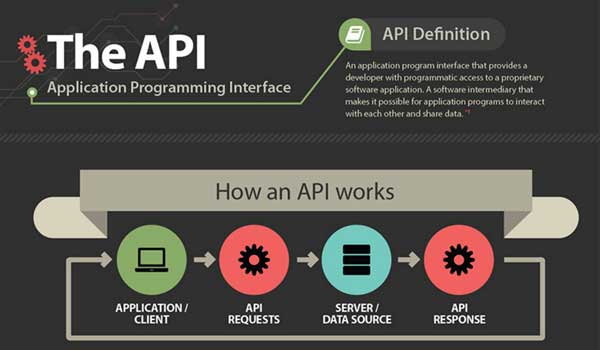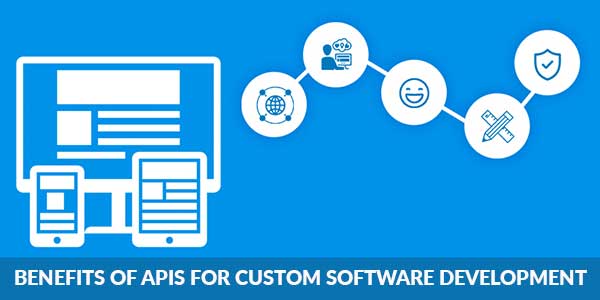
Lately, there’s been plenty of talk about the critical role of APIs in boosting any business model, with an entire array of advantages for companies of all shapes and sizes. While the focus may not have been so much from the viewpoint of custom application development service providers, APIs are extremely beneficial to these professionals. API stands for an application programming interface.
APIs benefit an organization in a way that all professionals also are at the receiving end of so many benefits. These days, most custom software development services specialize in the development of APIs, which are easy to the consumer, truly reliable, and well-documented. In a fundamental way, APIs are changing how data could be used, opening up whole new business models as well as product strategies.
Table of Contents
Custom APIs, What Are They?
Custom APIs are responsible for a business or organization being able to share a Facebook page or YouTube videos. It has improved how we assemble web apps with the ability to communicate with one another and making use of each other’s functionality consequently. The main reason why custom APIs matter a lot for organizations in the modern market today is that they allow faster innovation, which helps them overcome the common hindrances to change.
In general, organizations have their own unique integration requirements, thus using a ready-made API by themselves won’t do much for them. The custom API that you should build has to fit your requirements and allows better decision making and stronger customer relationship.
The Pros of APIs For Developers:
Developing APIs for the specific requirements of a business organization is one of the most in-demand services that a custom software development company caters to these days. Why? Because APIs provide numerous advantages not just to organizations, but also to software developers as well.
Check out the pros below.
1.) Automation:
Automation is the foremost solid benefit of APIs for developers. Rather than people, computers do the work, cutting down the time of development. With APIs, developers are able to handle work faster and update workflows in a manner that they get more productive faster. Through the use of APIs, organizations could update their workflows for more productivity.
A lot of custom application development companies equip their developers with API’s since it’s a faster approach to accomplishing a task, and requires less human effort as well.
2.) Application:
Since APIs could access application components, the information and services delivery is more flexible. Each system requires change over time, and custom APIs could help change and deliver the system faster.
For a lot of businesses, it takes money and time to introduce a new system change. If you however integrate the API technology into the system, there would be better data migration, and information could be reviewed in a better way.
3.) More Scope:
The irony of using any contemporary interface is paddling information faster and in the safest possible way. By integrating APIs, an app layer could help for a smoother distribution of information to other systems as well as introduce services to the new clientele.
The exciting part of this interface is that it lets developers build new audiences with personalized service. An API, therefore, is the requirement of the hour and has the power of bringing a dynamic change in the systems of an organization.
4.) New Available Data:
What’s great about the API is its amazing social equality feature. Whenever information is to be shared with all, the API shares it with everyone and not the chosen few. Nevertheless, if the responsibility must be given to a different system, things would be completely different.
You have to integrate a suitable API so the system for this to happen. Check out some of the most popular APIs in Google for a list of all the available top-notch instances.
5.) Efficiency:
As soon as you gain access to the API, publishing new content fast is easy. Automatically, the system publishes content and makes it available for each channel. The content therefore will be seamlessly shared with a massive audience.
The feature furthermore consumes less time and less costly than traditional marketing. One of the numerous reasons why many organizations incorporate an API is to yield better efficiency results.
API Success Examples:
Simply put, APIs enable organizations to move into markets that they never may have considered before. Early adopters could expand and grow revenue by joining forces with other companies. Various examples of organizations that effectively deploy APIs.
Rather than creating its own payment, mapping, or communication services, Uber made use of the best of those programs and connected all of them through APIs. Those who witnessed Twitter’s early days would remember that the user interface wasn’t so intuitive always. TweetDeck however built a better User Interface on top of the engine of Twitter, leading to a more seamless UX.

An API-Driven Strategy Business Benefits:
Organizations that implement and use APIs get to expect these benefits:
1. Reduced Market Time And Costs
One of the key benefits of a strategy that’s API-driven is the faster market time and development effort reduction. Software application development providers understand that a lot of the functionality they require to create an app exists elsewhere already. They learned to not spend precious resources and time reinventing the wheel but rather rely on APIs from third-party platforms that are cost-effective, or through using API’s that they’ve made already.
2. Higher-Level Digital Experiences
Because developers would be empowered to create solutions across any channel via APIs, this makes a more engaging and better experience for audiences, whether they be partners, employees, or customers. APIs could enable delivering services like data collection, personalization, and integration. Moreover, as APIs continue growing and become more popular, the available capabilities would only grow and improve.
The Steps To Developing An API:
Step One: Architecture
Integrating an API could be critical to your organizations and that’s why you should plant the API blueprint before development. You should also take into account all the major stakeholders. An API design requires comprehensive brainstorming on the attributes and features that it should include for the efficiency of integrations.
Step Two: Major Features
Timestamps are one of the most critical features to include in an API. It widens the search criteria for users. Furthermore, it helps consumers search through various dates and even get to access search history.
For search-based organizations, adding more search filters via APIs is paramount. Another attribute in the APIs is sorting, which helps users in modifying their search. Moreover, it also helps them sort data that they should access. Next is having JSON support or RESTful APIs.
While choosing between a Single Object Access Protocol or SOAP and Representational State Transfer or REST may have some confusion, REST is a more efficient and lightweight way of developing APIs compared to SOAP. The last feature, but certainly not the least is an authorization. An API has to authorize any user before data access.
Authorization with OAuth make sure of better security, and it also has fewer processing times as well. With authorization, creating a user-friendly experience takes less time.
Step Three: Methodology
App throttling is one of the most popular methodologies in the development and integration of an API. It helps a system monitor loads and redirects traffic if necessary. Moreover, it’s also a terrific way of boosting app security.
While developing authorization to APIs, enforcing control of API gateways is necessary. They must be the central authority point to ascertain that no user could access data without the right authorization.
Some network proxies support only certain protocols and not HTTP. That’s why an API could override HTTP; it’s one of the most vital parts of API development.
Step Four: Documentation And Testing
Documenting an API could help developers in understanding the infrastructure. Also, it helps them understand effective communications between components that underlie the architecture. A thorough API development documentation could ascertain all the data required for future tweaks and enhancements.
In the last step, API testing provides the data required for analyzing the way users interact with systems. Thus, you could build more efficient features for your APIs to make a user-friendly app. Furthermore, you could even automate testing with the numerous available tools in the market.
Conclusion:
The growing relevance of APIs in our lives today is becoming more and more evident. Just like doors, APIs provide access to both information and functionality to other apps and systems. On the other hand, they share a lot of common characteristics with doors, such as for instance, they’re secure and could be monitored closely.
APIs add business value since they enable them to monetize information assets, complying with new regulations, and allow innovation since they provide access to organization capabilities. To conclude, APIs are emerging as a critical capability for navigating today’s digital age. As companies big and small integrate the Internet of Things as well as other smart technology into their ecosystem, the success lies in the adoption of strategies, which are API-driven.

 About the Author:
About the Author:












Be the first to write a comment.